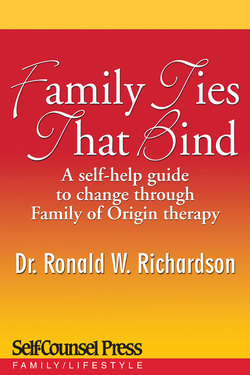Читать книгу Family Ties That Bind - Dr Ronald W. Richardson - Страница 15
На сайте Литреса книга снята с продажи.
2.2 “I did it my way” — The rebels
ОглавлениеRebels look as though they want distance and independence, but because real independence is too scary, they stay close and act rebellious. When A says do this, B does that, even if doing this would have been better.
The rebel never learns how to be secure about being different. The rebel is so involved in rebelling, in not doing and not being the way others want, that the rebel never decides what he or she does want. The rebel who is busy fighting against other people’s goals isn’t able to set his or her own goals. For the rebel, independence means doing the opposite of what others want. However, by doing this, the rebel is still being controlled by someone else. The other person is still calling the tune; the rebel just plays the flip side.
Of course, to be a successful rebel, you need someone to rebel against. Most rebels can easily find people who are quite willing to play the heavy and tell the rebel what to do. And that person, the authority, is always right: “Do that and you’ll — be sorry; get hurt; not pass; be fired; have an accident.” When the prophesied doom happens, the authority can say, “I told you so. You should listen to me (be like me).” But then that person jumps in and picks up the pieces, and takes on the responsibility of whatever disaster befell the rebel. So the rebel seldom has to bear the consequences of his or her actions. Someone is always around to bail him or her out.
Often, rebels are the second child of the same sex in a family: a second boy or second girl. In their family, they spent a lot of time defining themselves as different from the older child and fighting for acceptance in their own right. Usually, their sibling was more “approved of” in the family. A younger same sex sibling will often marry someone who is an oldest sibling and proceed to rebel against this authority. The oldest, who was in charge of younger siblings, will gladly try to assert authority over the spouse.
Some relationships can go on for quite a while with one person being the authority and always getting to be right and one person being the rebel and never having to be responsible.
Example
Su-lin, a second sister, married Nickolas, an oldest brother. In many ways they were quite compatible because of her dependency and his willingness to be in charge. But Su-lin didn’t like the idea of being dependent. She became something of a feminist and talked about how men hold women back. Yet she never really took any steps to be more self-directing. Though she complained about Nickolas making decisions for her, she kept going along with them. Then he died of a heart attack, and she didn’t know what to do with her life. Nickolas had just been a convenient cover for her fear of being a separate, self-sufficient person. Her rebellion was superficial.
QUESTIONS
1. Who was rebellious in your family of origin? How were others affected?
2. What about in your life today? Are you either the authority or a rebel against an authority? What would you be doing with your life if you weren’t engaged in this struggle?
